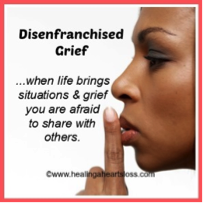Disenfranchised grief is a component of grief that is not shared with others for a variety of reasons. An individual may not feel they are worthy of sharing their grief with others. Perhaps society in general does not want to hear the grief story or does not realize grief stories exist.
Is it ignorance or the business of life that causes society to look the other way and not see the pain of grief in someone’s eyes? The griever becomes adept at putting on a mask to hide what is going on inside, but the eyes are said to be the window to the soul; is anyone looking?
I have written articles on losses associated with partners, children, abortion, pets, suicide and more recently losses related to hoarding to name a few. In all areas of grief there are components of loss that are not shared openly with others for fear of ridicule, denial, stigma and unacceptance on the part of others.
An individual may have reasons of their own for not sharing what they really feel, such as; shame, fear, guilt, disbelief, unworthiness, not wanting to be a bother and not wanting to be a disappointment to others.
The heaviness of grief and all that goes with it in any given situation may be the reason some individuals do not reach out for support from anyone. What can others do to help?
To help someone who you believe is hurting and not sharing their story, ask the question, “Would you like to talk about what is troubling you?” The response may be “No” but you posed the question. Let the individual know you are supportive and are open to talking any time they want.
Being supportive is the first step, but realize, you cannot force someone to seek help or talk about their situation; as the saying goes, “You can lead a horse to water but you cannot make them drink”.
The journey through the ups and downs of life is experienced by each of us differently. The journey of grief is no different. Some people feel it is not right to be happy or to feel joy in life after a loved one has died. I often ask such a person, “What do you feel or think your loved one would want for you now that they are gone?” Most individuals answer, “happiness, living life, having joy in my life, being healthy, pain free etc.”
Try switching the roles and think of how you would want your loved one to be if you were no longer alive. Would you want them to be consumed with pain, anger, sadness, and the heaviness of grief for a long time and as in some cases for years?

